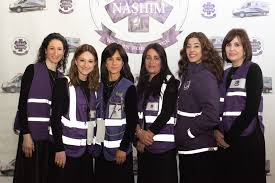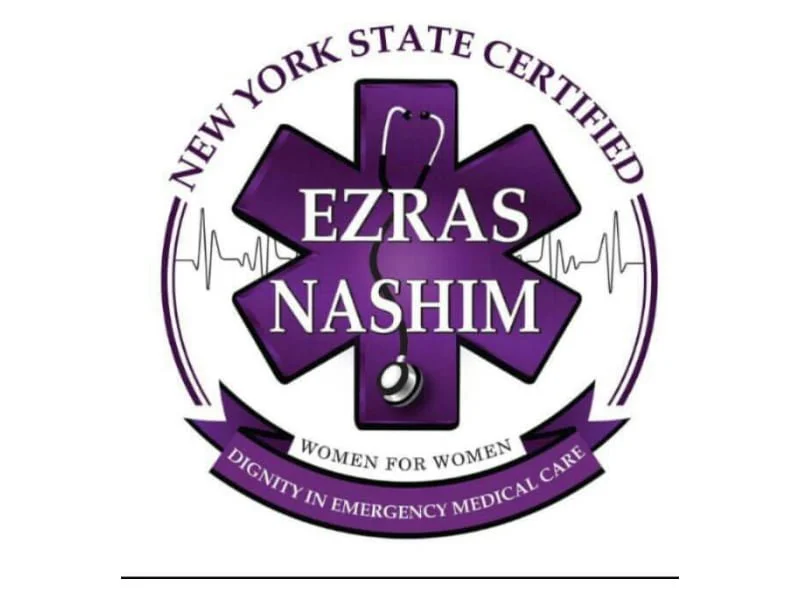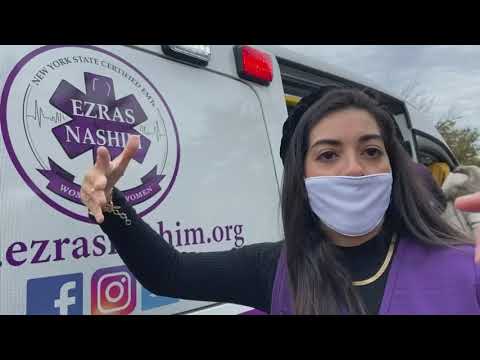|
Getting your Trinity Audio player ready...
|
Edited by: Fern Sidman
Brooklyn’s all-female emergency medical service, Ezras Nashim, continues to expand its reach across New York City despite facing opposition from male-dominated EMS groups. According to a report that appeared on Thursday in The New York Post, since receiving their ambulance license in 2020, this unique EMT corps, comprised of ultra-Orthodox Jewish women, has been providing life-saving care to women in some of Brooklyn’s most traditional communities. They focus on supporting women during medical emergencies, from childbirth to critical care transport, especially in culturally sensitive situations where female patients prefer female care providers.
Ezras Nashim, which translates to “helping women” in Hebrew, was established in 2012 by a group of ultra-Orthodox women who sought to fill a gap in emergency medical services in their community. Within Borough Park, Brooklyn—a neighborhood with a large ultra-Orthodox Jewish population—women who require medical assistance, particularly in intimate situations like childbirth, often feel uncomfortable with male first responders, as per the information provided in The Post report. Ezras Nashim’s formation was intended to offer culturally sensitive emergency care, provided by women for women.

The all-female EMT group faced significant opposition from the all-male Hatzalah, a longstanding ultra-Orthodox EMS organization that serves Jewish communities around the world. In 2019, Ezras Nashim’s request for an ambulance license was denied by a state agency, which many believe was influenced by members of Hatzalah. However, The Post report said that in a victory for the group, the New York State Emergency Medical Services Council approved Ezras Nashim’s ambulance certificate in 2020, allowing them to purchase their first vehicle—a $91,000 ambulance wrapped in soothing purple and white hues, which has become a symbol of their success and growth. Since then, they have handled over 1,500 emergency calls within a 2.7-square-mile radius of Borough Park.
Ezras Nashim has also since acquired a second ambulance, a smaller van-style vehicle costing $220,000, designed to better navigate through New York City’s heavy traffic, The Post report noted. This second vehicle allows them to expand their coverage area and respond to more calls across various neighborhoods.
Ezras Nashim has since grown, with approximately 50 trained EMTs responding to emergencies in various neighborhoods, including the Flatbush, Bensonhurst, and Kensington sections of Brooklyn. The information contained in The Post report indicated that the group is currently planning to extend their services to additional areas, such as Ocean Parkway, Coney Island, Prospect Park, Crown Heights, and Williamsburg. They are using real-time data to monitor call volumes and assess which communities require their services the most.
Rachel Freier, a 59-year-old paramedic and founder of Ezras Nashim, is a key figure behind the group’s expansion. Freier, who is also a criminal court judge, plays a dual role as a paramedic and ambulance driver, the report in The Post said. Her leadership has been instrumental in overcoming resistance and growing the organization to serve more women in need.

Ezras Nashim has been a godsend for women in the ultra-Orthodox community, providing compassionate and culturally aligned medical care. The report in The Post pointed out that for women such as 74-year-old Borough Park resident Hinda Frankel, the service has been indispensable. After an incident in which she severely cut her finger, Frankel’s daughter urged her to call Ezras Nashim. The Post reported that she was impressed by their prompt, sensitive, and professional response, commenting, “I feel women understand women better—they just do.”
Freier emphasizes that the female EMTs’ unique ability to empathize and understand their patients’ needs adds another layer of care. The comfort and safety felt by female patients receiving help from other women is a cornerstone of Ezras Nashim’s mission.
Despite the persistent challenges from male counterparts in Hatzalah, Freier and her team remain determined to provide essential services to Brooklyn’s ultra-Orthodox women. The opposition they face reflects broader cultural tensions within the community regarding gender roles, but Freier and her team are breaking down barriers while staying true to their religious values.
Ezras Nashim has gained increasing recognition, partly due to the documentary 93Queen, which chronicles the group’s journey to becoming a licensed ambulance service. Named after the FDNY radio code assigned to the group, the film highlights the challenges and triumphs of the all-female EMT team, as was revealed in The Post report. The documentary has drawn attention to their unique role in the ultra-Orthodox community and their continued growth as they work to expand their services across New York City.
Also pointed out in The Post report was that what began as a bold initiative to address the specific cultural needs of Orthodox Jewish women has grown into a lifeline for diverse communities, including Muslim and African women who share similar sensitivities about receiving care from female professionals.
Many rabbis also opposed the group, citing concerns about women stepping into roles traditionally held by men in their society.
Freier emphasizes that the religious restrictions typically imposed on women in the ultra-Orthodox community are overridden in cases of saving lives. The report in The Post confirmed that normally, Freier would not be allowed to drive an ambulance or treat patients due to these restrictions, but when lives are at stake, religious laws prioritize the preservation of life over adherence to certain gender norms.
“All the religious restrictions that we have are overwritten to save a life,” Freier explained, when speaking with The Post. “If I wasn’t a trained first responder, it wouldn’t be appropriate for me to go and drive the ambulance and treat patients because I’m not allowed to do it.” This principle allows Ezras Nashim to function within the framework of their faith while still providing essential medical services to women in their community.
The organization’s ability to balance religious observance with modern medical needs is one of the key reasons they’ve gained such widespread acceptance, even in the face of strong opposition. They stand as a testament to how deeply-held religious beliefs and the need for professional medical care can coexist.
Freier’s daughter, Leah Freier Levine, the Chief Operating Officer (COO) of Ezras Nashim, is one of the driving forces behind the group’s continued success. At just 26, Levine has witnessed firsthand the growth of the organization and the impact it has had on the women in her community. Reflecting on the journey, Levine told The Post, “Despite all odds and despite the naysayers, we really grew so much. It’s so important to me to help the women in my community but the work I do.”
Levine’s personal connection to Ezras Nashim goes beyond her role as COO. She has used the service for her own medical needs, calling on the female EMTs to transport her to the hospital during the births of her last two children. She plans to call them again for the birth of her third child, which is due soon. The report also mentioned that her personal experience as both a leader within the organization and a patient reflects the deep trust and reliance that women in the ultra-Orthodox community have placed in Ezras Nashim.
Ezras Nashim provides a broad spectrum of emergency medical services. As Freier aptly put it, “We handle calls from birth to death.” The EMT corps is frequently called to assist in childbirth emergencies, such as helping women deliver babies in bathtubs or on the floor when labor progresses too quickly to reach a hospital. According to The Post report, their services are not limited to physical emergencies alone; they also fulfill the emotional and spiritual needs of women, including transporting terminally ill patients whose dying wish is to be cared for by their all-female team.
Ezras Nashim’s influence is not limited to Brooklyn. Levine and Freier have ambitious plans to expand the organization to other cities across the United States. “I’m getting calls and emails every day, … ‘we need you, we want you,’” Levine explained when speaking with The Post, citing requests from communities in Chicago, Los Angeles, and Florida.
The demand for an all-female EMS service in religious communities across the country highlights the uniqueness and necessity of Ezras Nashim’s mission. Many women, particularly those from culturally or religiously conservative backgrounds, prefer to receive medical care from other women, especially in emergencies involving childbirth or other sensitive situations.
Levine sees the group’s first expansion as a stepping stone toward a broader nationwide presence. “Starting with our first new expansion is like the first stepping stone, and it’s showing you [that], yes, we can expand – and we’re going to do it,” she told The Post.
One of the most significant milestones for Ezras Nashim has been the group’s achievement of Advanced Life Support (ALS) certification. This advanced training, which took 18 months to complete, equips the EMT corps with critical life-saving skills. Indicated in The Post report was that with ALS certification, these women are now trained to perform more complex medical procedures, including administering IVs, monitoring EKGs, using heart monitors, and delivering medication directly to patients.
This leap in medical capabilities marks a crucial step in Freier’s vision of ensuring that women in her community receive the highest quality of emergency care possible. The training not only allows Ezras Nashim to respond more effectively to life-threatening emergencies but also gives the women in the group a true sense of empowerment and accomplishment in their roles as first responders.
The group’s ability to navigate the cultural complexities of the ultra-Orthodox world while providing cutting-edge medical care has set a powerful example. Freier’s vision, combined with the skills and dedication of her team, has revolutionized emergency medical services for women in some of the most underserved communities in New York City.
Ezras Nashim is much more than an ambulance service. It is a transformative force within the ultra-Orthodox Jewish community and beyond, providing women with the opportunity to take an active role in saving lives while also respecting cultural values. By expanding their reach and upgrading their medical capabilities, Ezras Nashim is setting the standard for culturally sensitive emergency care, all while breaking down barriers that have traditionally limited women’s roles in public service. As they continue to grow, their impact will undoubtedly inspire further advancements in female-led healthcare initiatives in communities around the world.




